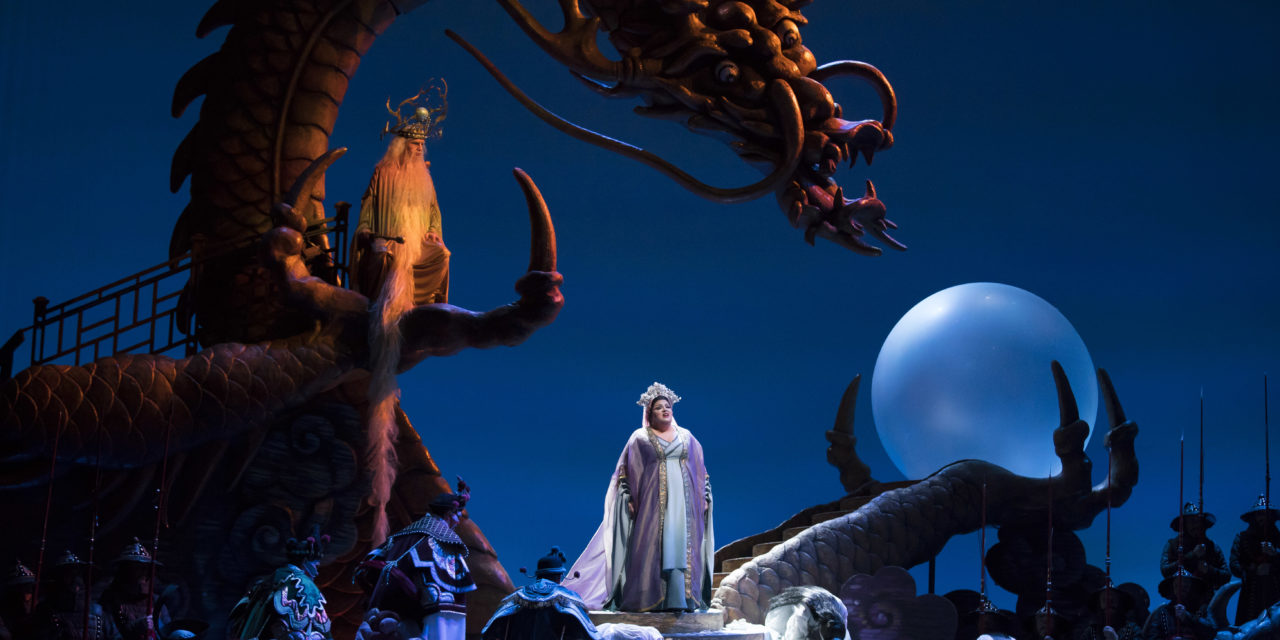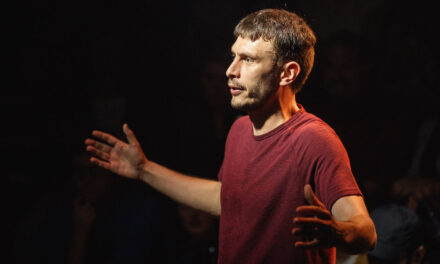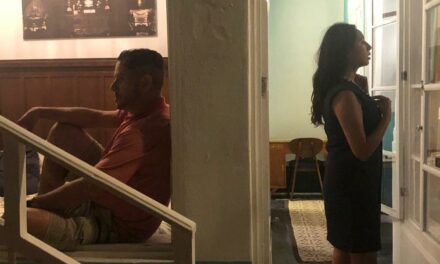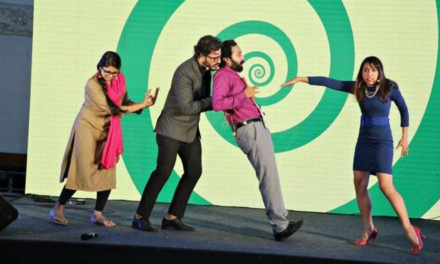Giacomo Puccini’s final and unfinished opera, the exotic fantasy Turandot, gets the Lyric Opera treatment in their winter slot in Chicago. With a blend of Lyric first-timers and veterans alike, this production is a spectacle of design and performance that indulges in Puccini’s heightened drama in all senses of the word. Sunday’s matinee at the Lyric Opera House downtown proved that the company is capable of tackling this fairy tale of grand proportions. In all its lavish grandeur, the piece managed to leave the audience moved despite a few head-scratching artistic and directorial choices. A faithful rendition of a culturally problematic idiom, this production–though visually and aurally stunning in its execution–is a little hard to swallow in 2017.
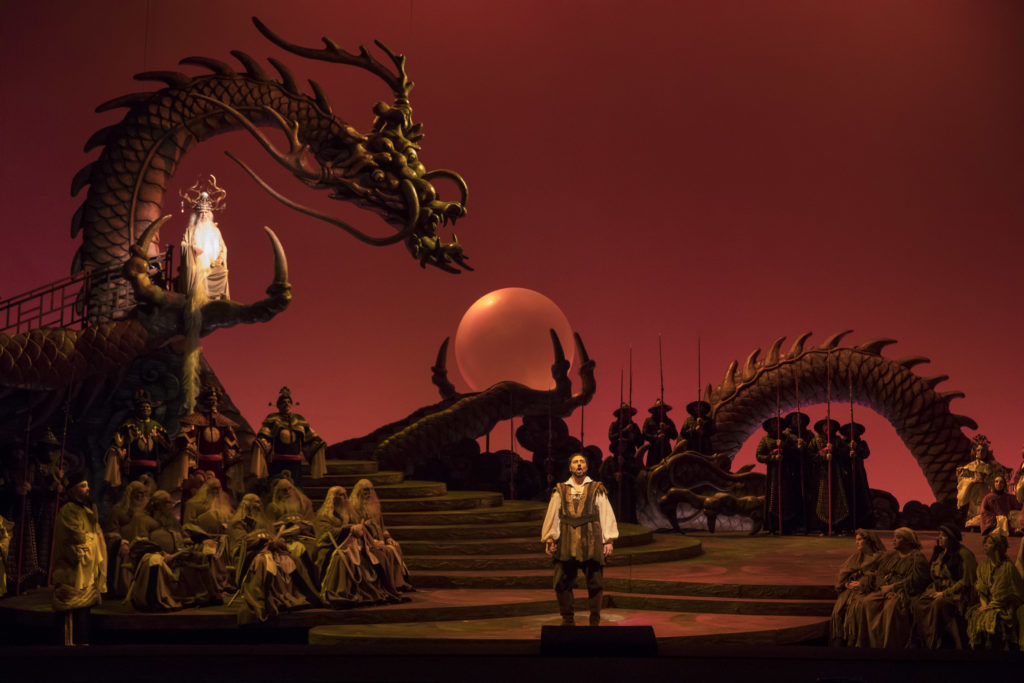
Josh Lovell and Stefano La Colla in Turandot. © Todd Rosenberg Photography 2017
Set in ancient Beijing, the opera explores a legendary world operated by ancestral Eastern logics and, of course, Puccini’s famous theatricality. He trades in his previous verismo aesthetic for this Chinese fairy tale, adopting an Eastern tonal language and exotic instrumentation into his score. Conductor Sir Andrew Davis painted a lush picture with every note soaring in the historic Lyric Opera House. An offstage brass band was a touch distracting, but even this ad hoc delivery could not diminish Davis’ masterful appreciation of Puccini’s illustrious score. With particular attention paid to the assimilated Chinese melodies, Davis highlighted Puccini’s most vibrant and unique colors.
The peasants of the Forbidden City live under the rule of the disdainful Turandot (Amber Wagner) who will only acquiesce to marriage if her suitor answers three riddles correctly. In true operatic fashion, the punishment for failure in her conquest is death. Who falls in love with the distant princess but the passionate Calaf (Stefano La Colla)? Despite the pleas to abandon this doomed pursuit from his devoted father Timur (Andrea Silvestrelli) and his secretly pining servant Liu (Maria Agresta,) Calaf miraculously solves the three riddles.
Turandot is distraught at the idea of being mastered by a man like her ancestors before her, and in sympathy for her, Calaf agrees to die instead if she discovers his name. In a moment of heartrending intensity, Liu sacrifices herself rather than reveal her master’s identity. Here, contemporary composer Arturo Toscanini declared that Puccini “laid down his pen,” only to be picked up by Franco Alfano, who finished the opera. His divisive Hollywood conclusion finds the ice princess’s heart melted as she gives into Calaf’s forceful advances.
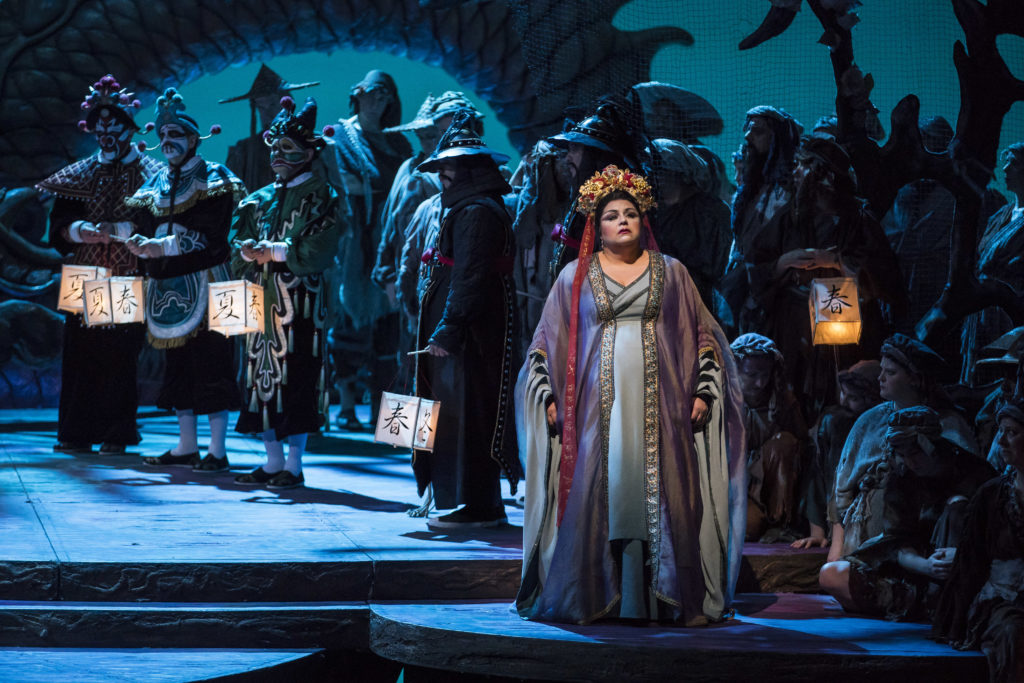
Amber Wagner in Turandot. © Todd Rosenberg Photography 2017
Performances by Amber Wagner and Maria Agresta shine as this production’s glittering jewels. Lyric regular and celebrated Ryan Opera Center alumna Amber Wagner did not disappoint as the titular Turandot. Indeed the Lyric’s diamond, Wagner’s soprano sparkles with clarity and precision. A notoriously vocally demanding part, Wagner rose to the occasion for the daringly high aria In Questa Reggia. While the vocal strain was heard in the high tessitura to start, she warmed up to a powerful passaggio by the aria’s end. While the chemistry with her tenor counterpart left something to be desired, their duet at the end of Act II was skillfully both pained and delicate.
If Wagner was the diamond, Maria Agresta was the ruby at the heart of the Lyric’s production of Turandot. Her portrayal of the slave Liu is rife with fervent longing and grace, and her voice is a formidable match to one of the opera’s most exquisite arias, Signore Ascolta. General Director Anthony Freud states that this aria “invariably reduces listeners to tears with its sweetness and sheer heart.” This can only be seconded by the unrestrained “bravo!” bursting from an audience member in the back and the sound of sniffling theatre-goers attempting to maintain composure after a truly moving performance. Janai Brugger will replace Agresta in January, and she has remarkable shoes to fill.
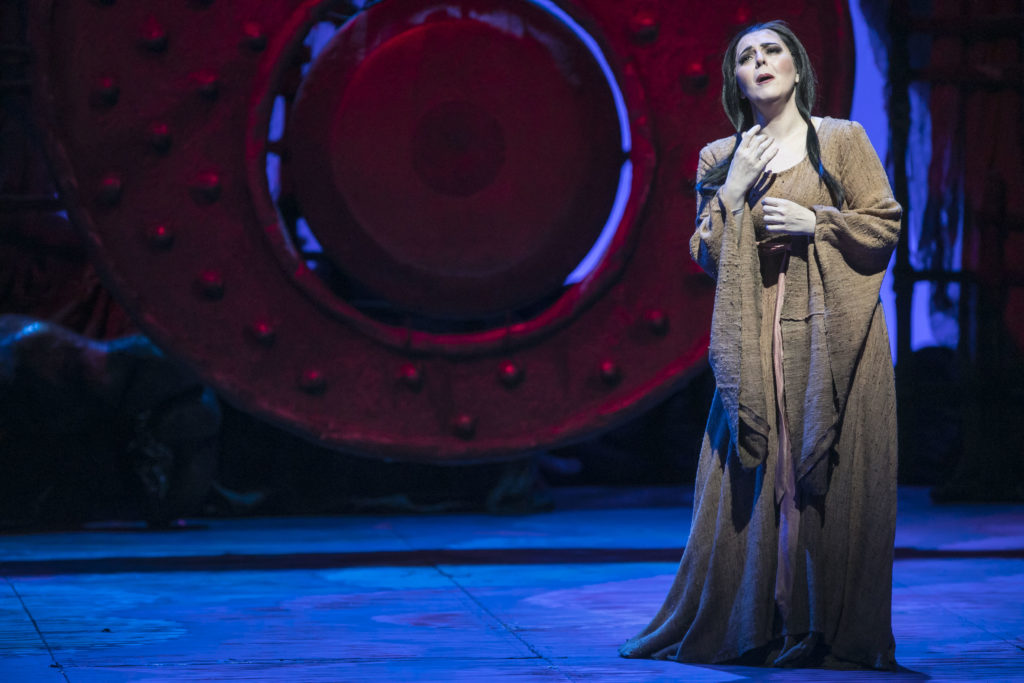
Maria Agresta in Turandot. © Todd Rosenberg Photography 2017
No stranger to Puccini’s work, Italian tenor Stefano La Colla has triumphed both Calaf and Tosca’s Cavaradossi from Milan to Berlin. He imbued Calaf with lovesick energy and earnest passion, but failed to deliver on the climaxes of Puccini’s ample phrases and seemed to be at fault for any pitchy meanderings in the duets with Wagner. La Colla redeemed himself, however, in his rousing rendition of the opera’s most famous aria Nessun Dorma.
Andrea Silvestrelli was lovely as the concerned Timur, heartrending as he “endures, long forgotten, awakes, and moves our hearts to pity.” Zachary Nelson, Rodell Rosel, and Keith Jameson as ministers Ping, Pang, and Pong respectively, were a breath of fresh air as the Greek chorus of almost Gilbert and Sullivan energy. Josh Lovell as the aging Emperor Altoum was a puzzling choice, his youthful sound creating a slightly insensitive caricature that was not helped by his comically long beard.
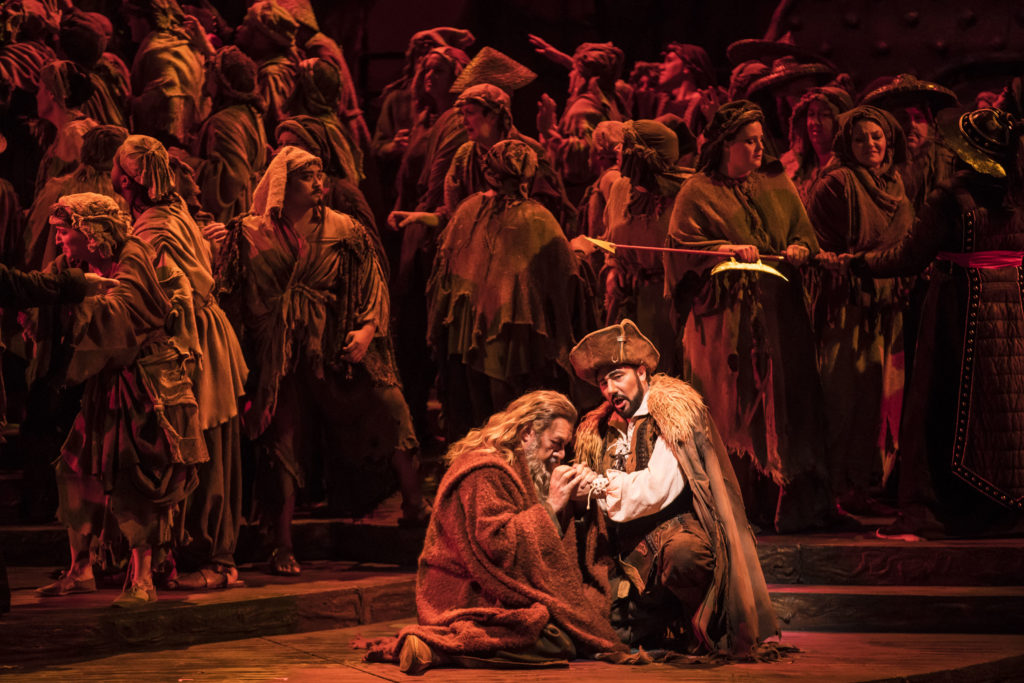
Andrea Silvestrelli and Stefano La Colla in Turandot. © Todd Rosenberg Photography 2017
Allen Charles Klein’s production design transports us to Eastern antiquity, bringing the Forbidden City to life on this Midwestern stage. The first act opens with ragged muslin sails covering wooden grates, the heads of failed suitors on spikes punctuating the looming dread over the city. These are later replaced by intertwining branches and finally lifted to an unobstructed dawn, well lit by designer Chris Maravich. A large dragon winds around the stage, its watchful eyes presiding over the tragic and unbelievable events as they unfold. In his clutches lies a glowing orb. Once a moon, then the dwelling place of the princess, later the emblem of her wrath, and finally the site of Liu’s sacrifice, the bubble’s mystical properties were left unexplained and its purpose unjustified. While the mystery might have a place in legendary antiquity, it ultimately distracted from honest performances of the actors in a world that already required an ample suspension of disbelief.
From old sages to seductive maidens, Klein’s costumes and Sarah Hatten’s makeup design were ornate and detailed in their own right. While the commitment to the Eastern vision was impressive, it gestured toward a larger, systematic issue that fell on the shoulders of director Rob Kearley–what he himself describes as the “misogynistic portrayal of female characters and the racial stereotyping of the Chinese in the piece.” This “theatrical challenge” is addressed in the program in the form of a director’s note and opera notes by Susan Halpern, but nowhere manifested onstage.
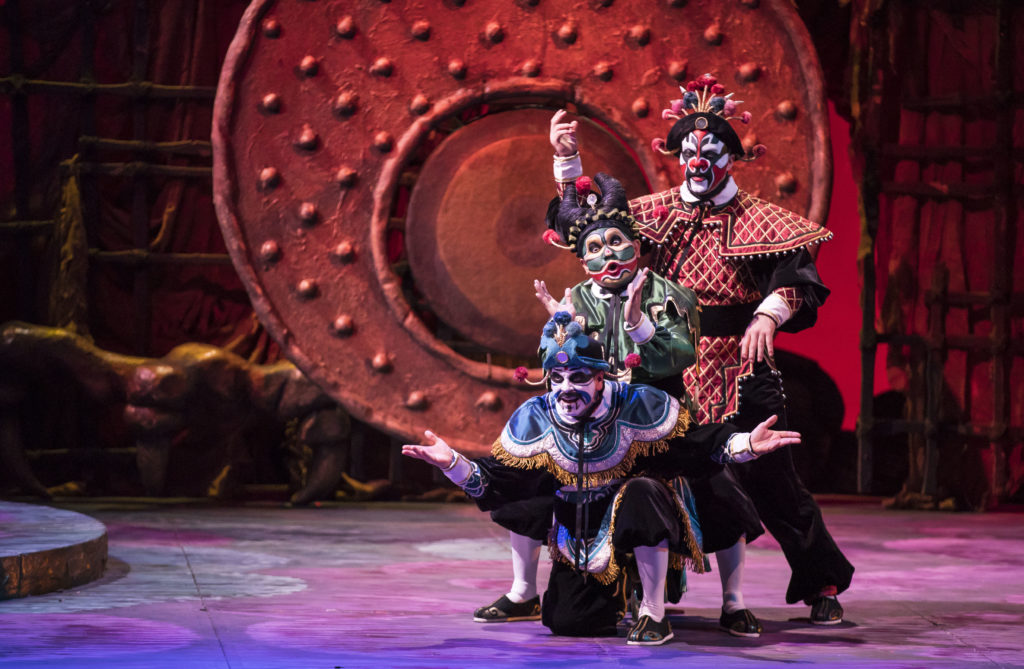
Keith Jameson, Rodell Rosel, and Zachary Nelson in Turandot. © Todd Rosenberg Photography 2017
Nothing was done to tackle what Halpern calls “shocking and culturally insensitive” material. Kearley’s staging and Klein’s design both fell short in transforming an opera embedded in misogyny and racial stereotyping into a social commentary relevant to a modern audience. The traditional portrayal of ancient China and the whitewashing of actors failed to address these “culturally insensitive” elements altogether. Simply noting this disparity in the program did not excuse these missed opportunities to redirect problematic practices in opera.
While the Lyric Opera’s production of Turandot services Puccini’s sumptuous score with commendable performances and an ambitious design, a traditional rendition is ultimately an off-putting choice for audiences today. For an enchanting visual spectacle and Puccini as you have never heard him before, however, Turandot is not to be missed.
This post was written by the author in their personal capacity.The opinions expressed in this article are the author’s own and do not reflect the view of The Theatre Times, their staff or collaborators.
This post was written by Kristin Tomecek.
The views expressed here belong to the author and do not necessarily reflect our views and opinions.

